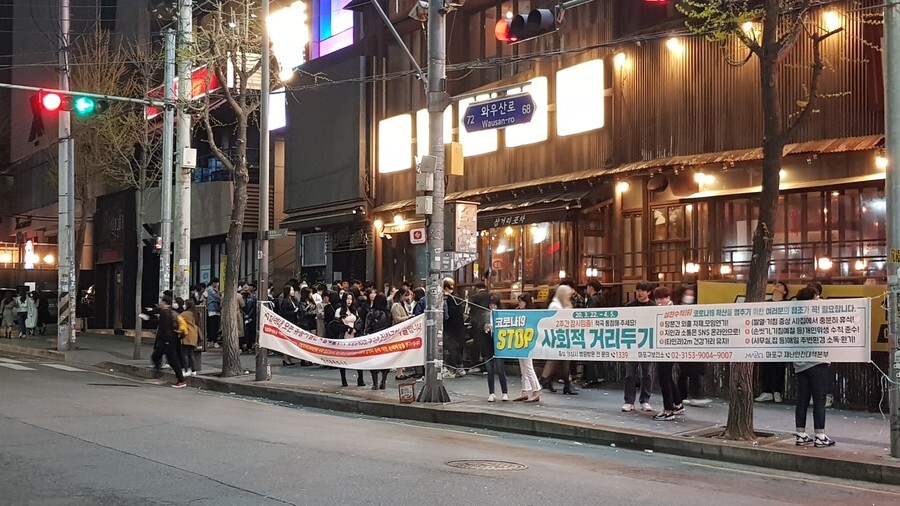hankyoreh
Links to other country sites 다른 나라 사이트 링크
Young Seoulites still find ways to enjoy nightlife, despite shutdown of bars and clubs

“Take a brief two-week pause! Everyone do your part in social distancing.”
A banner has gone up on Wausan Road in Seoul’s Mapo District, which is normally packed with tipsy visitors until the early morning on weekends. Despite an assembly ban that requires nightlife establishments to close their doors temporarily due to the global novel coronavirus pandemic, the street was as brightly lit as daytime after 12 am on Apr. 12.
The Hankyoreh paid visits that evening to Seoul’s nightlife hotspots such as the areas near Gangnam Station, Itaewon, and Hongdae. While the more famous clubs and room salons were firmly closed down, groups of people stood awaiting admission in front of so-called “hunting pochas” mainly frequented by a younger clientele. Most were wearing masks, but a portion could be seen chatting with friends or smoking cigarettes without masks on.
A hunting pocha is a type of drinking establishment that connects visitors with members of the opposite sex. Four well-known hunting pochas in the Hongdae area had anywhere from 30 to 60 people standing close together in front awaiting entrance. After cases of coronavirus transmission at nightlife establishments in Gangnam, the city of Seoul imposed an assembly ban from Apr. 8 to 19 on 422 nightlife establishments, including colatheques, clubs, and bars. Since the hunting pochas are classified as restaurants rather than entertainment establishments, however, they were not included under the ban.
A look inside at one hunting pocha in Hongdae showed a bustling establishment where customers were packed close together as they chatted at their tables.
“I think a lot of people are coming to the hunting bars because the clubs are closed and there aren’t many places to go,” said a 29-year-old company employee surnamed Jeon who was visiting the Hongdae area with friends.
When asked whether they were worried about the virus, a 22-year-old surnamed Park in front of one Gangnam hunting pocha said, “Sure I’m worried, but [the number of infections] has been decreasing, and I figure it’ll be alright.”
“I’m here with my friends,” Park said.
Another man in his 20s said he had been waiting for 30 minutes to get inside a hunting pocha.
“It’s just a bar. I don’t think the coronavirus matters all that much,” he said.
The nightlife establishments subject to the assembly ban were firmly closed. Large warnings posted on their doors read “Entertainment establishment assembly ban.” When the Hankyoreh visited on Apr. 11, six pubs and one karaoke bar in the Yeoksam neighborhood and three pubs and one club near Gangnam Station were all shut down with locks on their doors. The Itaewon area was also noticeably quieter than on typical weekends.
For a three-day period from Apr. 9 to 11, the city of Seoul and National Police Agency launched a joint inspection of nightlife businesses in eight regions of the city, including Hongdae and Itaewon; the areas around the Sillim, Gildong, Konkuk University, Gangnam, and Yeongdeungpo Subway Stations; and the neighborhood of Bangi. Proprietors and visitors violating the assembly ban are subject to up to 3 million won (US$2,461) in fines and may be subject to damage claims for treatment and disease control costs in the event that a person is diagnosed with the virus as a result of the violation.
By Kang Jae-gu, staff reporter
Please direct comments or questions to [english@hani.co.kr]

Editorial・opinion
![[Column] Season 2 of special prosecutor probe may be coming to Korea soon [Column] Season 2 of special prosecutor probe may be coming to Korea soon](https://flexible.img.hani.co.kr/flexible/normal/500/300/imgdb/original/2024/0426/3317141030699447.jpg) [Column] Season 2 of special prosecutor probe may be coming to Korea soon
[Column] Season 2 of special prosecutor probe may be coming to Korea soon![[Column] Park Geun-hye déjà vu in Yoon Suk-yeol [Column] Park Geun-hye déjà vu in Yoon Suk-yeol](https://flexible.img.hani.co.kr/flexible/normal/500/300/imgdb/original/2024/0424/651713945113788.jpg) [Column] Park Geun-hye déjà vu in Yoon Suk-yeol
[Column] Park Geun-hye déjà vu in Yoon Suk-yeol- [Editorial] New weight of N. Korea’s nuclear threats makes dialogue all the more urgent
- [Guest essay] The real reason Korea’s new right wants to dub Rhee a founding father
- [Column] ‘Choson’: Is it time we start referring to N. Korea in its own terms?
- [Editorial] Japan’s rewriting of history with Korea has gone too far
- [Column] The president’s questionable capacity for dialogue
- [Column] Are chaebol firms just pizza pies for families to divvy up as they please?
- [Column] Has Korea, too, crossed the Rubicon on China?
- [Correspondent’s column] In Japan’s alliance with US, echoes of its past alliances with UK
Most viewed articles
- 1AI is catching up with humans at a ‘shocking’ rate
- 2Korea’s 1.3% growth in Q1 signals ‘textbook’ return to growth, says government
- 3Is Japan about to snatch control of Line messenger from Korea’s Naver?
- 4After election rout, Yoon’s left with 3 choices for dealing with the opposition
- 5No good, very bad game for Korea puts it out of Olympics for first time since 1988
- 6Will NewJeans end up collateral damage in internal feud at K-pop juggernaut Hybe?
- 7[Column] Season 2 of special prosecutor probe may be coming to Korea soon
- 81 in 5 unwed Korean women want child-free life, study shows
- 9[Column] Park Geun-hye déjà vu in Yoon Suk-yeol
- 10‘We must say no’: Seoul defense chief on Korean, USFK involvement in hypothetical Taiwan crisis